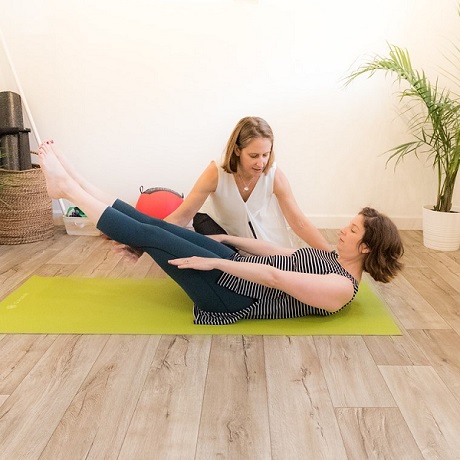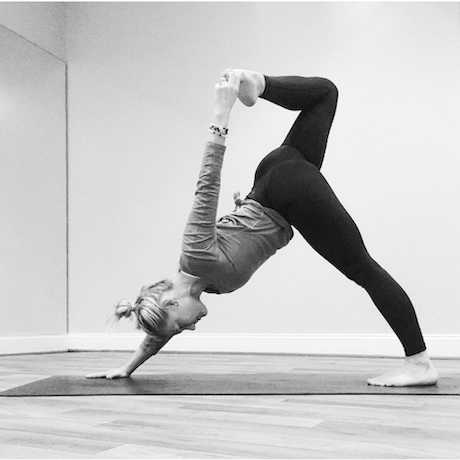“So why am I peeing myself?”

Recently “a friend” asked me about an issue she was having during her indoor cycling class: “I’ve never had this problem before and my kids are older, so why am I peeing myself in my SoulCycle class?”
My quick response was, “There are highly trained pelvic health physical therapists (PTs) out there who can help you. You don’t have to go through life peeing when you exercise, laugh, cough etc.”
That friend was Elizabeth Todd, who wanted me to mention that she is a “good jump-roper. Like, really, really good” and wants to continue that skill. So I told her about the pelvic expert, Dr. Carrie Pagliano.

I’ve known Dr. Carrie as a colleague and a friend for almost 20 years now. I have watched her evolve from an outpatient therapist to an expert in her field of pelvic health and more. She is an entrepreneur in private practice, as well as the President of the Academy of Pelvic Health Physical Therapy (www.womenshealthapta.org).
At the end of this post, you can read more about her impeccable credentials., but suffice it to say, Dr. Carrie is a big deal. I send all of my women’s health clients to her and I was even a patient myself after my first C-section (reminder: everyone can request PT after giving birth; it is now officially recommended by The American College of Obstetricians and Gynecologists). And a little known fact about Dr. Carrie? She takes the best group selfies!
After E. Todd’s question, I wanted to pick Dr. Carrie’s brain on the best way to guide women (or men!) when they have pelvic concerns, specifically in regard to continence. I scheduled a quick phone interview…
What are the most common questions you get from the general public about what you do?
Dr. Carrie: “You do therapy for this kind of stuff?”
“I thought it was too late to get treatment?”
“Can we treat this even if my kids are 12?”
“Why am I having issues now, when my children are older?”
Many women are surprised to not have issues in the immediate years after delivery, only to have an unexpected leak with a cough, sneeze, or exercise (known as stress incontinence) when their kids are in middle or high school. The startling onset of leakage can coincide with perimenopause and menopause. Local hormones, estrogen and testosterone, provide tissues with stiffness and tissue integrity, important for maintaining continence and organ support. Many women can have underlying muscular deficits, like weakness or incoordination, which are asymptomatic until hormone changes in perimenopause reduce support.

Sudden stress incontinence seems to come from nowhere, but they may have had issues all along without symptoms. Change in symptoms may also depend on starting a new exercise or sport, as this could pose a significant challenge to controlling intra-abdominal pressure (the pressure down on the pelvic region including the bladder) that the muscles and tissues can’t handle, resulting in leakage.
What is the treatment plan for stress incontinence later in life, say 40s, 50s, and beyond?
Dr. Carrie: Although women may have similar symptoms, they may have different reasons for having those symptoms depending on their biology, past history including births, how they use their pelvic floor (do they relax or strain to void?), and any other aspects of movement, posture, or respiration that might influence symptoms.
I like to lay all aspects of the problem out with my patient and find their unique “recipe” of why they have their symptoms. How much is a result of muscular strength, coordination, and endurance, or, is there a hormonal component? Is it worth going back to their OB to find out more about hormone replacement therapy or topical hormones (always taking into consideration medical history, including family breast cancer history, etc.)? The patient’s stage in life is always a component of symptoms. If a patient is in perimenopause, it must be considered as a possibility that hormones could be impacting the integrity of the pelvic floor.
Additionally, with women in their 40s and 50s, they can start to have discomfort with intercourse. With hormonal changes, the tissues become sensitive, resulting in superficial pain with sex.
We need more awareness of the role of perimenopause and menopause in areas other than osteoporosis, such as in later onset urinary leakage. With aging we need to take care of ourselves and the more activity we do, the better we will age. With the pelvic floor, in addition to hormones, it’s also important to look at movement and breathing strategies so that you can stay active as long as you want…you should be able to do yoga inversions and not have vaginal gas, or lift something heavy and not worry about what color pants you’re wearing because you might leak. Nobody wants to sit in their friend’s car and worry they’ll leave a pee stain.
Women don’t have to live like this and physical therapy can be the answer!
If someone went to their OB, would that doctor know to recommend Physical Therapy?
Dr. Carrie: No, unfortunately, women must be their own advocates, but it’s improving! One of the largest barriers can be that many physicians continue to think Pelvic PT is just Kegels. We now know that these issues are more complicated than that and Kegels aren’t the answer for everything. Many physicians who have strong relationships with physical therapists can be very collaborative. Our patients are the best advocates in educating their doctors on the success of pelvic physical therapy. Sharing their own stories of success with effective conservative treatment with their physician can help another patient find answers sooner with earlier referral.
A recent patient of mine was playing tennis with her friend. The friend said “yeah, I pee myself” but no one had ever talked to her about it. My patient took the time to share her own story with her friend and let her know there physical therapy could be an option for her to improve her symptoms. More and more women are talking openly about their symptoms with friends and their healthcare team. The more open the conversation, the more likely we can get help to women who need it.
I have the chills!!!
Dr. Carrie: The power lies in patients and women to connect their circles and connect their friends. If you ask your healthcare professional for physical therapy and they say no, find another provider that supports evidence-based, effective treatment that gets results. Some women unfortunately do need surgery. It’s important to also understand that even if you do need surgical intervention, it’s likely you’ll have better outcomes if you try physical therapy before having surgery anyway.
Some surgical options women hear about most include mesh sling, correcting pelvic organ prolapse or stress urinary incontinence. Women also may have hysterectomies, which can also result in pelvic floor problems. The important piece to understand is why a woman needs surgery. Many times women have issues because of uncontrolled downward pressure, resulting in organ prolapse or leakage. Habits such as breath-holding with lifting, bearing down, and straining with constipation can all contribute towards worsening symptoms.
If a woman sees a pelvic PT prior to surgery and learns modifications and how to improve these strategies, it’s possible that the patient will be able to control the downward pressure on the pelvis and protect the surgery site, potentially resulting in a reduced revision rate.
So here’s the deal with having physical therapy for pelvic issues: it’s a win-win no matter what you do. There is no downside!
What is your drop-the-mic take-away that you tell your patients?
Dr. Carrie: As women, once postpartum, we are always postpartum. Just because your babies aren’t babies anymore doesn’t mean we can’t improve symptoms ranging from urinary leakage and painful sex to pelvic organ prolapse and diastasis recti.
All 50 states have direct access to physical therapy, meaning you don’t need a prescription from your doctor to see a PT. If you want to get assessed and you’re not sure what to do you can go directly to a physical therapist. Pelvic PTs are fantastic advocates for women’s health and we have so much to offer!
You can find more information and/or schedule an appointment with
Dr. Carrie at www.carriepagliano.com
About Dr. Carrie
Dr. Carrie J. Pagliano has been a dynamic leader in clinical care and education in the areas of women’s/pelvic health and orthopaedics for nearly 20 years. Dr. Pagliano received her Masters in Physical Therapy from the University of the Sciences in Philadelphia in 1999 and Doctor of Physical Therapy from University of St. Augustine for Health Sciences in 2007. Dr. Pagliano is a double Board Certified Clinical Specialist in Orthopaedics and Women’s Health and holds Manual Therapy Certification from University of St. Augustine for Health Sciences.
Dr. Pagliano is the founder of Carrie Pagliano PT, LLC. For more than 10 years she was the program lead/founder for the Pelvic Physical Therapy clinical program/physical therapy residency at MedStar Georgetown University Hospital in Washington, D.C. She is currently serving as the sole physical therapist on the Advisory Board for the Pelvic Floor Disorders Network: National Institutes of Health, Eunice Kennedy Shriver National Institute of Child Health and Human Development.
An active member of the Section on Women’s Health of the American Physical Therapy Association (soon to be the Academy of Pelvic Health Physical Therapy), she currently serves on the Board of Directors as President. Dr. Pagliano is an adjunct professor at Marymount University in Arlington, Virginia and served as Instructor of Clinical Rehabilitation Medicine at Georgetown University School of Medicine in Washington, D.C. for more than five years.
Dr. Pagliano speaks nationally in the areas of pelvic floor education, pain science, and integrative models of practice in orthopaedic and pelvic physical therapy. She is a national media spokesperson for the American Physical Therapy Association. Dr. Pagliano is a vocal advocate for women and mothers in leadership in the physical therapy profession.
Carrie is an avid runner, yogi, CrossFitter, wife and mom. She resides in Arlington Virginia with her husband and two children.
- About the studio
Mind the Mat Pilates & Yoga was founded in 2008 by Megan Brown, Doctor of Physical Therapy and Polestar Certified Practitioner of Pilates for Rehabilitation and Sara VanderGoot, Nationally Certified Massage Therapist and Registered Yoga Teacher (e-RYT 200, RYT 500). In their private practices as physical therapist and massage therapist respectively Megan and Sara observed that many of their clients were coming in with similar needs: relief for neck and shoulder tension and low back pain as well as a desire for more flexibility in hips and legs, stability in joints, and core strength.
Together Megan and Sara carefully crafted a curriculum of Pilates and yoga classes to address needs for clients who are pregnant, postpartum, have injuries or limitations, who are new to Pilates and yoga, and for those who are advanced students and are looking for an extra challenge.
2214 Mount Vernon Avenue
Alexandria, VA 22301
703.683.2228









1 Comment
Thanks for covering this topic!